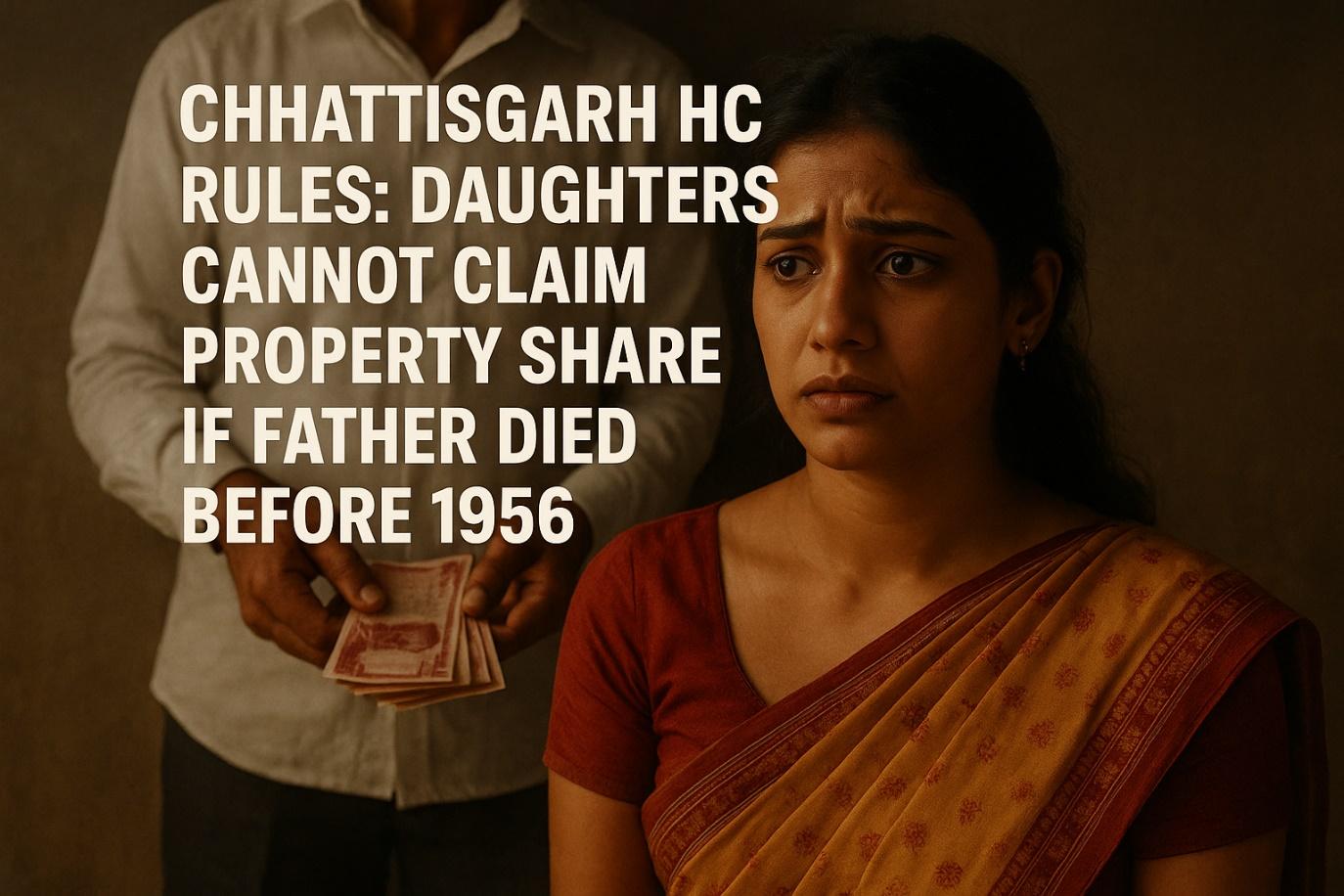In a significant clarification of Hindu inheritance laws, the Chhattisgarh High Court has ruled that a daughter cannot claim a share in her father’s property if he passed away before 1956 — the year when the Hindu Succession Act came into force.
The court emphasised that such cases are governed by the Mitakshara law, a traditional Hindu legal framework, under which only sons were entitled to inherit their father’s property. A daughter could claim a share only in the absence of a male heir.
Also read:-Supreme Court Orders Son to Vacate Properties, Upholds Rights of 80-Year-Old Father
What the Court Observed
Justice Narendra Kumar Vyas, in a judgment delivered on October 13, upheld the trial and appellate court rulings that had dismissed the claim of plaintiff Ragmania, who had sought partition of her late father’s property in Surguja district, Chhattisgarh.
Ragmania had filed a civil suit in 2005, claiming inheritance rights to her father Sudhin’s estate. However, since Sudhin had died around 1950–51, both lower courts dismissed her case on the grounds that the Hindu Succession Act, 1956, was inapplicable as the death occurred prior to its enactment.
The High Court concurred, noting that when a Hindu governed by Mitakshara law dies before 1956, his self-acquired property devolves entirely upon his son. A daughter’s right arises only if there is no surviving son.
The court further explained that the Hindu Law of Inheritance (Amendment) Act, 1929, did not diminish the son’s right but merely widened the pool of potential heirs in the absence of male descendants by including certain female relatives and the sister’s son.
Also read:-Delhi High Court Rules: Grandchildren Cannot Claim Grandparents’ Property If Parents Are Alive
Precedents and Legal References
While affirming the lower courts’ orders, the High Court cited Supreme Court judgments in Arshnoor Singh vs Harpal Kaur (2020) and Arunachala Gounder vs Ponnusamy (2022). These rulings reiterate that property inherited by a Hindu man before 1956 devolved exclusively upon his male heirs, with daughters entitled to a share only if no sons survived.
As Sudhin was survived by a son, the court concluded that Ragmania had no legal claim to the property, stating that the lower courts had “rightly applied the law” in dismissing her plea.
Also read:-Supreme Court Delivers Big Win for Homebuyers: Builders Must Pay 18% Interest on Delayed Possession
Similar Observations by Bombay High Court
This position echoes a ruling by the Bombay High Court last year, which held that daughters cannot claim inheritance if their father died before the Hindu Succession Act came into effect. The case involved Radhabai Shirke, who had sought a share in her father Yeshwantrao’s property.
Yeshwantrao, who died in 1952, had two wives and three daughters. Following his death, one of his widows, Bhikubai, continued to occupy the property and later willed it to her daughter, Champubai. Radhabai contested this will, seeking a half-share of the estate.
Both the trial and appellate courts rejected her claim, holding that under the Hindu Women’s Right to Property Act, 1937, Bhikubai was the rightful inheritor. The High Court upheld this decision, reaffirming that the 1956 Act could not apply retrospectively to cases where the deceased passed away earlier.
Also read:-Supreme Court Slams Speculative Investors, Calls Them ‘Slow Poison’ for Real Estate
The Broader Legal Context
The Hindu Succession Act, 1956, brought significant reform by recognising daughters as equal coparceners in family property. However, the law is not retrospective, meaning inheritance rights apply only when the father’s death occurred after the Act came into force.
In contrast, before 1956, the Mitakshara system placed inheritance almost entirely in the hands of male heirs. Daughters could claim a share only if there were no sons or grandsons.
In 2022, the Supreme Court reaffirmed that Hindu daughters are entitled to inherit their father’s property if there is no other legal heir and will have precedence over extended family members even if the father dies intestate. However, this principle applies strictly to cases post-1956.
Also read:-Signature Global Partners with WRI India to Curb Construction-Linked Air Pollution
Why This Matters
The Chhattisgarh High Court’s verdict reinforces a crucial legal distinction — that succession rights under Hindu law are determined by the date of death and not by the date of litigation. It also reaffirms that while gender equality in inheritance is constitutionally guaranteed today, the law cannot retrospectively alter property transfers made under older legal systems.
In a significant clarification of Hindu inheritance laws, the Chhattisgarh High Court has ruled that a daughter cannot claim a share in her father’s property if he passed away before 1956 — the year when the Hindu Succession Act came into force.
The court emphasised that such cases are governed by the Mitakshara law, a traditional Hindu legal framework, under which only sons were entitled to inherit their father’s property. A daughter could claim a share only in the absence of a male heir.
Also read:-Supreme Court Orders Son to Vacate Properties, Upholds Rights of 80-Year-Old Father
What the Court Observed
Justice Narendra Kumar Vyas, in a judgment delivered on October 13, upheld the trial and appellate court rulings that had dismissed the claim of plaintiff Ragmania, who had sought partition of her late father’s property in Surguja district, Chhattisgarh.
Ragmania had filed a civil suit in 2005, claiming inheritance rights to her father Sudhin’s estate. However, since Sudhin had died around 1950–51, both lower courts dismissed her case on the grounds that the Hindu Succession Act, 1956, was inapplicable as the death occurred prior to its enactment.
The High Court concurred, noting that when a Hindu governed by Mitakshara law dies before 1956, his self-acquired property devolves entirely upon his son. A daughter’s right arises only if there is no surviving son.
The court further explained that the Hindu Law of Inheritance (Amendment) Act, 1929, did not diminish the son’s right but merely widened the pool of potential heirs in the absence of male descendants by including certain female relatives and the sister’s son.
Also read:-Delhi High Court Rules: Grandchildren Cannot Claim Grandparents’ Property If Parents Are Alive
Precedents and Legal References
While affirming the lower courts’ orders, the High Court cited Supreme Court judgments in Arshnoor Singh vs Harpal Kaur (2020) and Arunachala Gounder vs Ponnusamy (2022). These rulings reiterate that property inherited by a Hindu man before 1956 devolved exclusively upon his male heirs, with daughters entitled to a share only if no sons survived.
As Sudhin was survived by a son, the court concluded that Ragmania had no legal claim to the property, stating that the lower courts had “rightly applied the law” in dismissing her plea.
Also read:-Supreme Court Delivers Big Win for Homebuyers: Builders Must Pay 18% Interest on Delayed Possession
Similar Observations by Bombay High Court
This position echoes a ruling by the Bombay High Court last year, which held that daughters cannot claim inheritance if their father died before the Hindu Succession Act came into effect. The case involved Radhabai Shirke, who had sought a share in her father Yeshwantrao’s property.
Yeshwantrao, who died in 1952, had two wives and three daughters. Following his death, one of his widows, Bhikubai, continued to occupy the property and later willed it to her daughter, Champubai. Radhabai contested this will, seeking a half-share of the estate.
Both the trial and appellate courts rejected her claim, holding that under the Hindu Women’s Right to Property Act, 1937, Bhikubai was the rightful inheritor. The High Court upheld this decision, reaffirming that the 1956 Act could not apply retrospectively to cases where the deceased passed away earlier.
Also read:-Supreme Court Slams Speculative Investors, Calls Them ‘Slow Poison’ for Real Estate
The Broader Legal Context
The Hindu Succession Act, 1956, brought significant reform by recognising daughters as equal coparceners in family property. However, the law is not retrospective, meaning inheritance rights apply only when the father’s death occurred after the Act came into force.
In contrast, before 1956, the Mitakshara system placed inheritance almost entirely in the hands of male heirs. Daughters could claim a share only if there were no sons or grandsons.
In 2022, the Supreme Court reaffirmed that Hindu daughters are entitled to inherit their father’s property if there is no other legal heir and will have precedence over extended family members even if the father dies intestate. However, this principle applies strictly to cases post-1956.
Also read:-Signature Global Partners with WRI India to Curb Construction-Linked Air Pollution
Why This Matters
The Chhattisgarh High Court’s verdict reinforces a crucial legal distinction — that succession rights under Hindu law are determined by the date of death and not by the date of litigation. It also reaffirms that while gender equality in inheritance is constitutionally guaranteed today, the law cannot retrospectively alter property transfers made under older legal systems.







